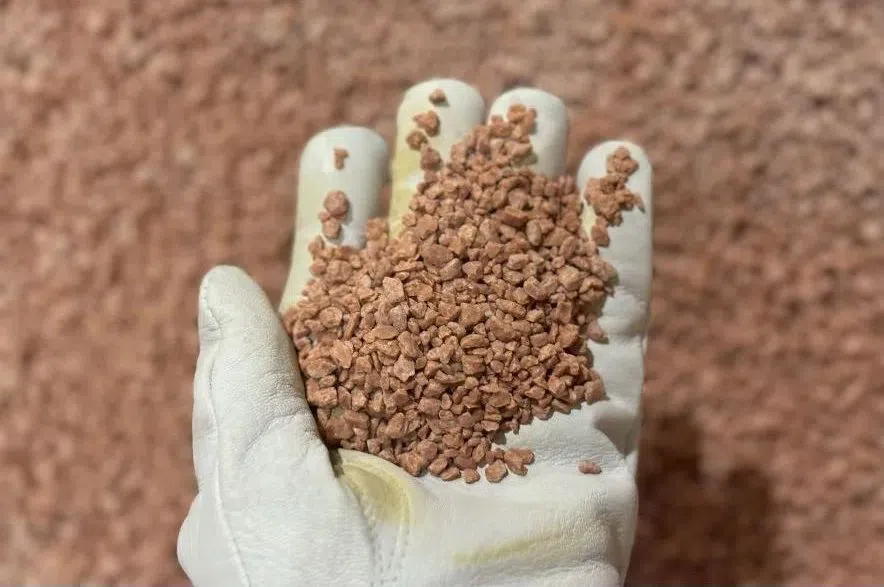As global trade tensions continue to make headlines, Saskatchewan’s potash sector has remained largely untouched — for now.
But with millions of tons of the mineral crossing the U.S. border each year, producers are watching the situation closely.
Marnel Jones, director of government & public affairs for The Mosaic Company in Canada, joined The Evan Bray Show to discuss the growing awareness around potash, its essential role in global food production and what’s at stake if trade policies shift.
She also spoke about the renewed public interest in where potash comes from, what it does, and why Saskatchewan plays such a vital role in feeding the world.
Listen to the full interview here:
This transcript has been edited for length and clarity.
Evan Bray: What is the current tariff status and impact for potash produced by Mosaic that is sold to the states?
Marnel Jones: Despite some of the information you might see out there, which has been confusing for sure, today, we are moving potash from Saskatchewan to the U.S. without any tariffs. Our potash is Kuzma compliant, so it does fall under our trade agreement with the U.S. That’s been the case for all but about three days in March, so we’ve been fortunate to see that status hold.
Bray: How big is the U.S. market in terms of potash?
Jones: For Mosaic, it makes up almost half of what we produce in a year. So about four million tons of what we’re making here in Saskatchewan is going into that U.S. market. So it’s not a small number.
Bray: All of the U.S. fertilizer products are on Canada’s potential tariff lists, including the phosphate that Mosaic sells to Canadian farmers. How about the reciprocal tariffs? How does that impact your company and local farmers?
Jones: It’s certainly something we’ve been watching very closely. Canada put all U.S. fertilizer products on that secondary tariff list that could be subject to a 25 per cent tariff. That does remain on pause at this moment. But should it ever come into effect, Mosaic does deliver about 1.2 million tons of phosphate fertilizers into Canada annually, and much of that is used by farmers here in Western Canada, right here in Saskatchewan.
That would have a huge impact on farmers in Canada should those tariffs come into effect. Not only our fertilizer, but something else Mosaic has been watching closely is that there are about $500 million worth of what we would call MRO materials, so things that we use for maintenance, reliability and operations that would also be subject to that 25 per cent tariff. So any of those metal-based goods that we use in mining operation. That would be another huge impact on the industry if that list ever does move forward.
Bray: It’s kind of subsided now, but there was a time where there were loud conversations on the potential for potash export quotas. Tariffs or taxes on potash that we are sending out of our country to apply pressure on the United States. I’m assuming that’s a bad idea, and Mosaic would not love that?
Jones: You’d be right on that analysis. The fact remains, potash is made in Canada. Phosphate is made in the U.S., and unfortunately, we really can’t change that scenario. So to think about putting export taxes or quotas on our potash, obviously, not only would it be hugely impactful to Saskatchewan, the industry and all the things that potash helps fund here in the province, but also to food security.
Sometimes, I think it’s lost that both potash and phosphate are fertilizers. Our farming community here in Saskatchewan understands that very well. But other parts of the world, and even here in Saskatchewan, sometimes it’s not as well understood just how crucial these nutrients are to our food supply. They’re responsible for over half of the food we produce. So you cut back fertilizer, you can’t get fertilizer applied when you need it. It’s going to have an impact on food security and what we’re able to buy at the grocery store, which will also increase in price, something we’ve been watching happen for a while now.
Bray: Mosaic is a big player in potash in the province, and is very philanthropic in our province as well. That does not go unnoticed. There are other players as well. Do you work together when it comes to threats like this? Do potash companies or mining companies come together, for example, to lobby the federal government? Is there any sort of collaborative work that happens?
Jones: Yes. We’re very fortunate to have very strong industry associations that represent us both here in Saskatchewan, with the Saskatchewan Mining Association. They’ve been very active in these discussions. And then also on the federal front, we work with Fertilizer Canada, and they represent all fertilizer producers across the nation. So we have two different avenues to really make sure our voices are being heard collectively, which helps make them a little bit louder.
Bray: We look at the U.S. announcing plans to remove sanctions from Russia, which would include fertilizer. How do things like that impact Saskatchewan production?
Jones: We ended up getting a lot of inquiries after that announcement was made by the U.S. government, where they were attempting to restore Russia’s access to the world, specifically market access for ag and fertilizer exports. The interesting thing is, what we’ve been seeing for quite some time is that Russia has not been restrained in any way in accessing the market. What sanctions existed were really not stopping their ability to get product into the North American market, particularly the U.S. and the rest of the world. So we’ve been seeing them operating at pre-invasion levels for quite some time, and notionally, don’t think that’s going to change the game in what we’re playing in today.
Bray: On the global scale, how impactful are our regulations and policy, whether it’s federal or provincial, on the potash industry, the market and your business? Because the key is you want to stay competitive, you’ve got trade partners around the world that rely on the potash you’re mining right here in Saskatchewan. Is there an even playing field when you throw in the regulations that we have in this country?
Jones: Last month on your program, I talked a lot about the competitors that we have in the pot industry, which is Russia and Belarus. China does produce potash, but most of it stays in the country to serve its very large market. But when we think about Russia and Belarus, they’re operating in an environment where they have extremely low-cost mines. Because they’re subsidized by the government, they get access to very low energy costs, very minimal taxes, low labour costs, and very little environmental regulation. So when you think about that environment that we’re competing against, obviously, it’s much different here.
I would even lean into conversation around the carbon tax, which is something that has been coming up here in our federal election, and more recently, on a provincial level, too, for things like the carbon tax. That’s a competitive advantage for our competitors. They’re not having that same tax put on the things that they’re making. For a mining company like Mosaic, when we talk about the industrial carbon tax, that includes our emissions, but then also the power we use to make our products, the pass-through costs on rail and transport. So what we’ve seen recently here in the province with a plug on the carbon tax is very beneficial to us when it comes to competing on the international stage. And quite frankly, the carbon tax has been very concerning to us in all its forms since it began.
Bray: We’re in the middle of a federal election, and I have talked lots about oil, gas and the energy industry on the air because they are vigilant in watching different platform promises and campaign speaking points from the different parties. What are the things important in this federal election campaign to your industry?
Jones: The carbon tax is a very important issue for us to have a better outcome on for areas like the potash industry that are making and selling the products that the world needs. But we also think about things like rail transport infrastructure and our supply chain. We have had many challenges over the last six years. Our rail system is full, our ports are at capacity, and our reputation as a reliable supplier has diminished over the past six years.
Here at Mosaic, we’ve estimated that we probably lost around 500 million tons of potash and $300 million of sales due to that repeated disruption to our rail, port and seaways because of different labour disputes over the past six years. So that’s another important election priority for us. How are we going to make sure our rail transport infrastructure and supply chain can get our products to market, and that we can improve capacity and efficiency? And in that same vein, we like to also mention it would be really helpful if we got the things that could go in pipelines off the rails, so we’d have more capacity for the things like potash and grain that need to move by rail.
Bray: Lots of different areas, when it comes to exports, are talking about diversifying portfolios, looking for other markets. Is that a thing for potash? Could Canada diversify away from the U.S.? And do we want to?
Jones: As you can imagine, there are lots of conversations being had about, ‘What can we do if the U.S. market is not maybe that premium market for us anymore?’ Fortunately, we do move our international potash through Canpotex, and so they are globally recognized as a superior marketing and transportation company that gets our potash to those international markets. And while we appreciate the idea of increasing exports to all these global countries that want potash, the trick is the infrastructure. It’s going to be quite challenging for us to move more product out to our port using our rail systems as it stands today. We’re going to need some serious investment to make that a reality.
Bray: People are talking about interprovincial trade barriers, they would have never talked about that before! We’re talking about diversifying trade markets, even industries, and the world seems to me much more aware. Certainly, we’ve known in Saskatchewan for a while the importance of potash. But now I feel like Canada is more aware. The U.S. is more aware. Is this nothing but positive, or is there some negative that comes with that spotlight being shone on your industry?
Jones: I think that probably more than ever, the word ‘Potash’ is being spoken here in Canada and across the border. I think that both Americans and Canadians are maybe having a better appreciation for how our supply chains work, how food gets put on the table, the incredible work that farmers do and how they do it to feed us all. And truly, we’ve had probably more attention put on potash in this country than ever before, which I think will support some of the things I talked about, some of the things we need to get done to make sure that we can continue serving the world with Saskatchewan potash.
So I’m hopeful that this entire situation turns into a positive one so that people understand the importance of potash, where it comes from, what it does, why it can’t be mined anywhere else in the world, and that we see some positive outcomes from what has been a very chaotic situation.











